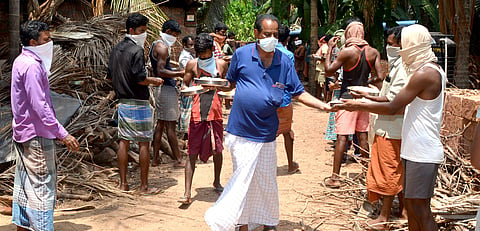

KASARAGOD: Tasleem (27), a native of Katihar district in Bihar, was all set to go home on March 31. He had booked his train ticket last December. But 10 days ahead of his date of journey, Kasaragod was locked down. Tasleem faint hope of reaching home was dashed when on March 22, the railways suspended all services till March 31.
He is among the 131 migrant workers from Bihar and Jharkhand now stranded at Porapad, a coastal village in Trikaripur panchayat.
"They lock-down the country soon after I wired my weekly earnings home. Now I neither have money nor work," said Tasleem, who has been working as a mason in Kasaragod district for the past six years.
Ganesh, a native of Jharkhand, works as an electrician and also as a farmhand, said he too sent Rs 4,000 home last week. "But I have some money left. Those who have help those who don't have. We are all in this together," he said.
The workers said all of them had tickets to go home on March 25 and 31 because there was little work during Ramazan and the rainy season.
Yet, the lockdown did not hit the 131 workers of Porapad hard like it did in several other places. The blow was cushioned by Abdul Khader (60), a former expatriate. "Without him, we would have been on the road," said Ganesh.
Khader put the 131 workers in 10 hall-size rooms, televisions, fans, a big kitchen, and 10 toilets.
He also has been providing them with food for the past 10 days, two times a day. "North Indian food," said Ganesh.
Khader got steel plates and tumblers on rent. In the initial days of the lockdown, the workers used to get chicken and beef. "Now lentil, rice, and soybeans," said Tasleem.
Khader, who retired as a telephone operator at Al Ain University in Dubai, said he spent around Rs 8,000 every day to provide them food. That is, he has already spent Rs 80,000. "I don't mind that because I was once in their position," he said.
Forty years ago, Khader landed in Dubai and cleaned the tables at a restaurant. After some years, he met the sponsor of the restaurant and told him his troubles. "He asked me to learn Arabic. I learned Arabic and he helped me get the job as a telephone operator in Al Ain University," he said.
He worked in the university for 30 years and retired four years ago.
Khader had employed a few of these migrant workers in his fields for vegetable cultivation. "When I heard of the lockdown, I did not think twice before taking over their responsibility," he said.
When asked about the expense, he said, "That's ok. What if the corona takes me tomorrow. The best thing money can do is the satiate the hunger of a person," he said.
Khader said the government must do something to take them home. "They are all worried. Their family is worried because of what they see on television," he said.
Ganesh said he had no trouble in Trikaripur. "But how many days can we sit here and eat without earning. We have a family to take care of back home," he said.
Tasleem wondered if the Railways would refund their ticket fare. Express contacted the Railway PRO who said: "They just need to come to the ticket counter before June 21 and the entire amount will be refunded, including the reservation charge. If it is an online ticket, the money will be credited in the bank account," the official said.
When this information was passed to Tasleem he sounded happy. "Chalo, kuch toh baccha," he said.